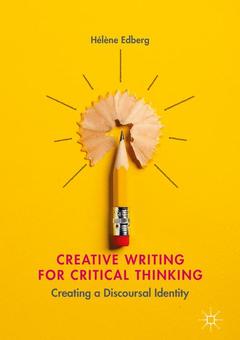Description
Creative Writing for Critical Thinking, Softcover reprint of the original 1st ed. 2018
Creating a Discoursal Identity
Author: Edberg Hélène
Language: English
Subject for Creative Writing for Critical Thinking:
Creative Writing for Critical Thinking
Publication date: 05-2019
416 p. · 14.8x21 cm · Paperback
Publication date: 05-2019
416 p. · 14.8x21 cm · Paperback
Creative Writing for Critical Thinking
Publication date: 02-2018
Support: Print on demand
Publication date: 02-2018
Support: Print on demand
Description
/li>Contents
/li>Biography
/li>Comment
/li>
This book explores narrative imagination and emotion as resources for learning critical meta-reflection. The author examines the learning trajectories of several students as they engage in learning to think critically through a new approach to creative writing, and details how learning through writing is linked to new discoursal identities which are trialled in the writing process. In doing so, she analyses the processes of expansion and change that result from the negotiations involved in learning through writing. This volume offers a completely new approach to creative writing, including useful practical advice as well as a solid theoretical base. It is sure to appeal to students of creative writing and discourse analysis as well as applied linguistics and language as identity.
Chapter 1. Introduction.- Chapter 2. Creative Writing and Critical Thinking - From a romantic to a socio-critical view on creative writing.- Chapter 3. Basic outlines of the research.- Chapter 4. Discoursal identity and subject.- Chapter 5. Text as a site of negotiation: a model for text-analysis.- Chapter 6. Writers' positionings.- Chapter 7. Critical meta-reflection.- Chapter 8. A follow-up study - creative writing for critical meta-reflection in a different context.- Chapter 9. Concluding discussion about discoursal identity and learning critical thinking through creative writing.- Chapter 10. Creative writing for critical meta-reflection - some educational implications.
Hélène Edberg is Senior Lecturer and Educational Developer at Södertörn University, Sweden. Her research interests are based around applied linguistics and rhetoric. She has been teaching creative writing for over a decade, and is particularly interested in identification processes linked to learning through writing.
Introduces a new analytical model, based on activity theory, making it possible to analyse learning through writing in student texts Examines student trajectories as they learn to think critically through creative writing Offers practical advice as well as theoretical grounding to support this new approach
© 2024 LAVOISIER S.A.S.
These books may interest you

Essays in Life Writing 160.25 €



